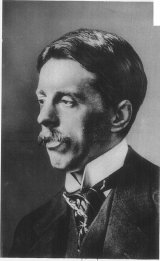Paris Nights and Other Impressions of Places and People Page #2
Enoch Arnold Bennett (27 May 1867 - 27 March 1931) was an English writer. He is best known as a novelist, but he also worked in other fields such as the theatre, journalism, propaganda and films. Bennett was born in a modest house in Hanley in the Potteries district of Staffordshire. Hanley was one of the Six Towns that were joined together at the beginning of the 20th century as Stoke-on-Trent and are depicted as "the Five Towns" in some of Bennett's novels. Enoch Bennett, his father, qualified as a solicitor in 1876, and the family moved to a larger house between Hanley and Burslem.
- Year:
- 1913
- 108,195 Views
“Farceuses, toutes les deux!” said the host, coming up, delightfully indulgent, but shocked that women to whom he had just played Ygdrasil, should be able so soon to throw off the spell of it. The pretty and sprightly woman, all in white, despairing, whisked impulsively out of the room, in order to recall to herself amid darkness and cloaks and hats that she was not a giddy child, but an experienced creature of thirty if she was a day. She came back demure, her eyes liquid, brooding. ***** “By the way,” said the young dramatist to the host, “Your People’s Concert scheme--doesn’t it move?” “By the way,” said the host, suddenly excited, “Shall we hold a meeting of the committee now?” He had a project for giving performances of the finest music to the populace at a charge of five sous per head. It was the latest activity of the publicist in him. The committee appeared to consist of everybody who was standing near. He drew me into it, because, coming from London, I was of course assumed to be a complete encyclopædia of London and to be capable of furnishing detailed statistics about all twopence-halfpenny enterprises in London for placing the finest music before the people. The women, especially the late laughers, were touched by the beauty of the idea underlying the enterprise, and their eyes showed that at instants they were thinking sympathetically of the far-off “people.” The librarian remained somewhat apart, as it were with a rifle, and maintained a desolating fire of questions: “Was the scheme meant to improve the people or to divert them? Would they come? Would they like the finest music? Why five sous? Why not seven, or three? Was the enterprise to be self-supporting?” The host, with his glance fixed in appeal on me (it seemed to me that he was entreating me to accept him as a serious publicist, warning me not to be misled by appearances)--the host replied to all these questions with the sweetest, politest, wistful patience, as well as he could. Certainly the people would like the finest music! The people had a taste naturally distinguished and correct. It was we who were the degenerates. The enterprise must be and would be self-supporting. No charity! No, he had learnt the folly of charity! But naturally the artists would give their services. They would be paid in terms of pleasure. The financial difficulty was that, whereas he would not charge more than five sous a head for admission, he could not hire a hall at a rent which worked out to less than a franc a head. Such was the problem before the committee meeting! Dufayel, the great shopkeeper, had offered to assist him.... The librarian frigidly exposed the anti-social nature of Dufayel’s business methods, and the host hurriedly made him a present of Dufayel. Dufayel’s help could not be conscientiously accepted. The problem then remained!. . . London? London, so practical? As an encyclopaedia of London I was not a success. Politeness hid a general astonishment that, freshly arrived from London, I could not suggest a solution, could not say what London would do in a like quandary, nor even what London had done! “We will adjourn it to our next meeting,” said the host, and named day, hour, and place. And the committee smoothed business out of its brow and dissolved itself, while at the host’s request a girl performed some Japanese music on the Pleyel. When it was finished, the librarian, who had listened to Japanese music at an embassy, said that this was not Japanese music. “And thou knowest it well,” he added. The host admitted that it was not really Japanese music, but he insisted with his plaintive smile that the whole subject of Japanese music was very interesting and enigmatic. Then the pretty sprightly woman, all in white, went and stood behind an arm-chair and recited a poem, admirably, and with every sign of emotion. Difficult to believe that she had ever laughed, that she did not exist continually at these heights! She bowed modestly, a priestess of the poet, and came out from behind the chair. “By whom?” demanded the librarian. And a voice answered, throbbing: “Henri de Régnier.” “Indeed,” said the librarian with cold, careless approval, “it is pretty enough.” But I knew, from the tone alone of the answering voice, that the name of Henri de Régnier was a sacred name, and that when it had been uttered the proper thing was to bow the head mutely, as before a Botticelli. “I have something here,” said the host, producing one of these portfolios which hurried men of affairs carry under their arms in the streets of Paris, and which are called serviettes; this one, however, was of red morocco. The pretty, sprightly woman sprang forward blushing to obstruct his purpose, but other hands led her gently away. The host, using the back of the arm-chair for a lectern, read alternately poems of hers and poems of his own. And he, too, spoke with every sign of emotion. I had to conquer my instinctive British scorn for these people because they would not at any rate pretend that they were ashamed of the emotion of poetry. Their candour appeared to me, then, weak, if not actually indecent. The librarian admitted occasionally that something was pretty enough. The rest of the company maintained a steady fervency of enthusiasm. The reader himself forgot all else in his increasing ardour, and thus we heard about a score of poems--all, as we were told, unpublished--together with the discussion of a score of poems. ***** We all sat around the rim of an immense circle of white tablecloth. Each on a little plate had a portion of pineapple ice and in a little glass a draught of Asti. Far away, in the centre of the diaper desert, withdrawn and beyond reach, lay a dish containing the remains of the ice. Except fans and cigarette-cases, there was nothing else on the table whatever. Some one across the table asked me what I had recently finished, and I said a play. Everybody agreed that it must be translated into French. The Paris theatres simply could not get good plays. In a few moments it was as if the entire company was beseeching me to allow my comedy to be translated and produced with dazzling success at one of the principal theatres on the boulevard. But I would not. I said my play was unsuitable for the French stage. “Because?” “Because it is too pure.” I had meant to be mildly jocular. But this joke excited mirth that surpassed mildness. “Thou hearest that? He says his play is too pure for us!” My belief is that they had never heard one of these strange, naïve, puzzling barbarians make a joke before, and that they regarded the thing in its novelty as really too immensely and exotically funny, in some manner which they could not explain to themselves. Beneath their politeness I could detect them watching me, after that, in expectation of another outbreak of insular humour. I might have been tempted to commit follies, had not a new guest arrived.
Translation
Translate and read this book in other languages:
Select another language:
- - Select -
- 简体中文 (Chinese - Simplified)
- 繁體中文 (Chinese - Traditional)
- Español (Spanish)
- Esperanto (Esperanto)
- 日本語 (Japanese)
- Português (Portuguese)
- Deutsch (German)
- العربية (Arabic)
- Français (French)
- Русский (Russian)
- ಕನ್ನಡ (Kannada)
- 한국어 (Korean)
- עברית (Hebrew)
- Gaeilge (Irish)
- Українська (Ukrainian)
- اردو (Urdu)
- Magyar (Hungarian)
- मानक हिन्दी (Hindi)
- Indonesia (Indonesian)
- Italiano (Italian)
- தமிழ் (Tamil)
- Türkçe (Turkish)
- తెలుగు (Telugu)
- ภาษาไทย (Thai)
- Tiếng Việt (Vietnamese)
- Čeština (Czech)
- Polski (Polish)
- Bahasa Indonesia (Indonesian)
- Românește (Romanian)
- Nederlands (Dutch)
- Ελληνικά (Greek)
- Latinum (Latin)
- Svenska (Swedish)
- Dansk (Danish)
- Suomi (Finnish)
- فارسی (Persian)
- ייִדיש (Yiddish)
- հայերեն (Armenian)
- Norsk (Norwegian)
- English (English)
Citation
Use the citation below to add this book to your bibliography:
Style:MLAChicagoAPA
"Paris Nights and Other Impressions of Places and People Books." Literature.com. STANDS4 LLC, 2025. Web. 10 Mar. 2025. <https://www.literature.com/book/paris_nights_and_other_impressions_of_places_and_people_110>.








Discuss this Paris Nights and Other Impressions of Places and People book with the community:
Report Comment
We're doing our best to make sure our content is useful, accurate and safe.
If by any chance you spot an inappropriate comment while navigating through our website please use this form to let us know, and we'll take care of it shortly.
Attachment
You need to be logged in to favorite.
Log In